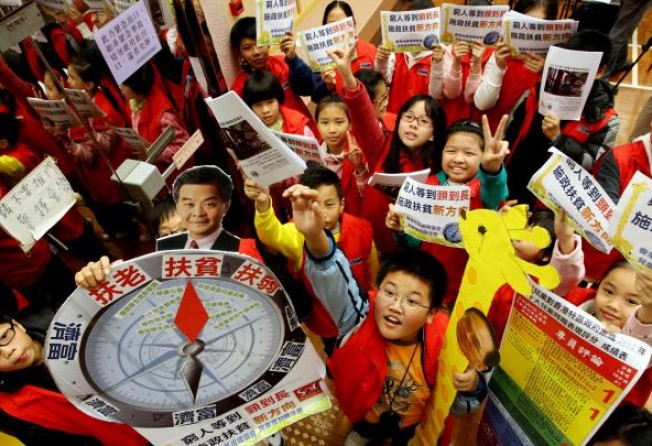Children's rights group gives Hong Kong black mark
Government scores just six out of 100 as underprivileged youngsters urge Leung not to forget them in his upcoming policy address

The chief executive is facing calls to tackle the needs of 300,000 underprivileged children in his upcoming policy address, after the administration scored just six out of 100 for its performance in helping needy children.
The rock-bottom score was gleaned from the seventh annual ratings exercise by the Children's Rights Association - and it was the seventh time the government had failed to get anywhere close to a pass.
The scores are based on how the government deals with 10 top issues of concern and are marked by 200 young ombudsmen in the association, which is made up of 1,700 underprivileged children. The government scored two points last year and zero in 2009.
The Society for Community Organisation, a human rights advocacy group under which the association operates, said Leung Chun-ying had taken some steps towards poverty alleviation since he took office.
"[Leung] has taken a little action but has no big policy," Soco community organiser Sze Lai-shan said. She noted that the present administration admitted there was poverty in the city, while the previous one said only that there was a wealth gap.
"Leung has promised 15 years of free education … and is allotting land to build more public housing flats," she said. "He has set up a commission on poverty and has promised to establish a poverty line. But the government has no policy targeting underprivileged children."
Housing issues topped the children's list of concerns and the government scored one point out of a possible 10 on this.
The association's report says some 20,000 children are living in substandard housing, such as cage homes and subdivided flats, and the applications of 3,000 households for public flats were frozen because the children were not permanent residents.
The government scored two points for helping cross-border families and one point each for education, social welfare and a comprehensive children's policy. It got zero for medical services; helping neglected children left to grow up on the streets; trans-generational poverty; failure to implement the United Nations Convention on the Rights of the Child; and the absence of a children's ombudsman and a children's rights committee.
Jessica Lee Kai-ying, 11, one of the association's ombudsmen, told how the owner of her 200 sq ft subdivided flat in Mong Kok had cut off the water and power after her mother missed one month's rent payment last year. In October this year, the new owner raised the rent from HK$2,500 a month to HK$4,000 and threatened to kick them out if they could not afford it. They managed to bargain it down to HK$3,000.
Lee came to the city in 2009 and now lives with her mother and 10-year-old brother in the subdivided flat with mouldy walls. Her mother, a sales representative, has only three rest days a month and often works on those days, too, in an effort to feed the family. Lee's father, unemployed, lives in Guangzhou.
Lee called for rent subsidies and rent controls to be reintroduced.
She added: "We want a relaxation of the rule for allocating public housing flats to [households with] children who have lived in Hong Kong for less than seven years - so that children can have equal opportunities in the wait for public housing."